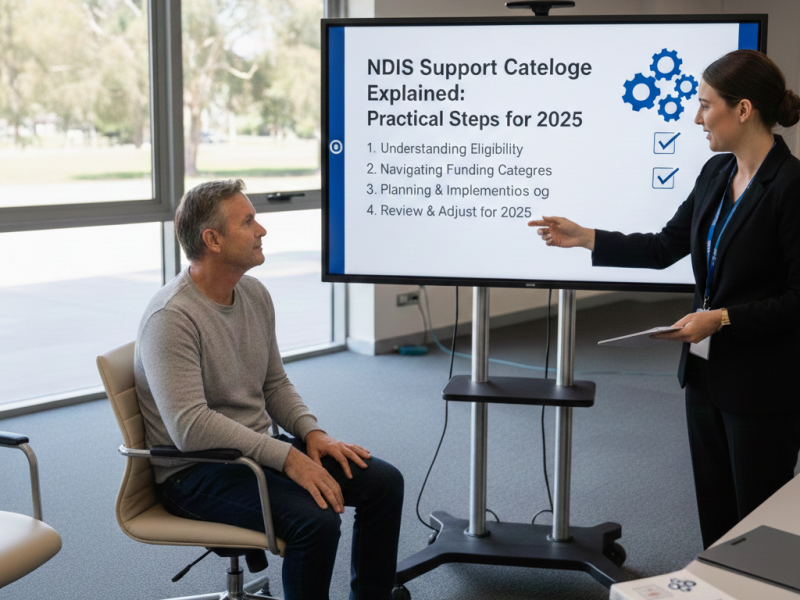The National Disability Insurance Scheme (NDIS) empowers people with disability to live more independently and connect with their community. A key part of this is transport funding, which enables Participants to access medical appointments, employment, social activities, and daily errands.
However, NDIS transport funding can be complex. It depends on each Participant’s level of independence, support needs, and how their plan is managed. While some Participants can drive or use public transport independently, others require assistance from a support worker or specialised transport services.
To ensure equitable access, the NDIS offers different funding categories based on individual circumstances. In this blog, we’ll explain how NDIS transport funding works, what’s covered (and what’s not), how Providers can support Participants effectively, and how funding is accessed and managed.
Want to Attract More NDIS Clients?
Get expert advice on how to market your services, connect with clients, and grow your practice.
How Transport is Funded Under the NDIS
Transport funding under the NDIS is primarily available for Participants who are unable to use public transport due to their disability. This funding supports regular, ongoing travel such as getting to work, school, day programs, or community activities—not emergency or one-off trips.
There are two main ways transport is funded:
- Transport Assistance (Core Supports – Category 2):
This allows Providers to claim for travel as part of delivering face-to-face supports in the community, such as when a support worker accompanies a Participant to an activity or appointment. - General Transport Allowance (Capacity Building – Category 4):
This is a direct payment to Participants who cannot use public transport. It helps cover the cost of travel by taxi, ride share, community transport, or private vehicle.
The type and amount of transport support in a Participant’s plan depends on their individual goals and level of need. Some Participants may receive regular payments to their bank account, while others rely on Provider-delivered transport supports.
Types of Transport Supports the NDIS May Fund
The NDIS can cover several transport-related supports to help Participants engage with their community, visit required appointments, and lead an independent life.
- Direct Transport Payments:
For Participants who are unable to use public transport may receive regular payments to assist with travel costs such as taxis, Uber, or private transport. These payments are typically paid fortnightly and managed by the Participant or their plan manager. - Support Worker Travel:
For when a support worker travels with a Participant, the NDIS may cover the worker’s time and travel costs—such as kilometres driven, tolls, or public transport fares—within NDIS price limits and with prior agreement. - Activity-Based Transport:
For group or centre-based activities, enabling Providers can charge shared travel costs when transport is part of the group program (e.g. community outings). The total transport cost is split among Participants attending. - Vehicle Modifications:
For Participants who own a vehicle and need modifications to drive or be transported safely (e.g. wheelchair lifts, hand controls) may receive capital funding under assistive technology—not core transport funding. - Specialist Transport Services:
For Participants with high support needs may be funded for disability-specific community transport or services with accessible vehicles and trained staff, often operated by councils or NDIS-Registered Providers.
What is NOT Funded by NDIS Transport Funding?
While the NDIS funds reasonable and necessary transport supports, some costs are considered everyday living expenses and are not covered. These include:
- General vehicle running costs like registration, fuel, or insurance.
- Travel costs for family members, informal carers, or friends.
- Transport unrelated to the Participant’s goals or funded supports.
- Overseas or holiday travel.
- School transport where it is the responsibility of the education system.
Funding must always relate to the Participant’s disability support needs and help them achieve their NDIS goals, and all claims should be reasonable within the context of the NDIS Plan.
Mobility Allowance
Mobility Allowance, once provided by Services Australia for people with disability who couldn’t access public transport, has now been phased out for most individuals.
NDIS transport funding has replaced it. Participants transitioning from the Mobility Allowance are typically reviewed during planning to ensure their new plan meets their transport needs. This allows for a seamless shift into the NDIS support structure.
NDIS Transport Funding Levels
Participants who cannot use public transport independently may be eligible for transport allowance funding under Category 4 of their plan. There are three levels:
- Level 1: Up to $1,606 per year – for occasional travel to community or social activities.
- Level 2: Up to $2,472 per year – for Participants working or studying part-time or attending day programs.
- Level 3: Up to $3,456 per year – for Participants with frequent transport needs, such as working or studying full-time.
The appropriate level is determined during the planning or review meeting, based on how often and how far the Participant needs to travel to meet their goals.
Service Provider and Community Transport
For Participants unable to use standard transport options, NDIS funding can cover community or specialist transport services. These services may include:
- Wheelchair-accessible vehicles
- Support from trained drivers or staff
- Coordination with other supports (e.g. day programs or medical appointments)
Many of these services are delivered by local councils, non-profits, or registered Providers—especially in regional areas where public transport is limited.
NDIS will pay for these services if they are considered reasonable and necessary for the attainment of the goals of the Participant. Fees for these services should fall within the NDIS Pricing Guidelines, and Participants are advised to verify if Providers are registered or meet the standards of the Commission.
Referrals Start With Reputation – We’ll Help You Build Both
From networking tips to service refinement, we guide NDIS providers toward lasting impact.
Final Thoughts
NDIS transport funding plays a vital role in ensuring that participants can live independently, stay connected, and reach their goals. For providers, understanding the types of transport supports available—and how to claim them correctly—can improve the participant experience and maintain compliance.
If you’re an NDIS Provider looking to streamline your transport-related supports or service agreements, Avaana offers resources, templates, and expert guidance to help!
FAQs
1. What transport supports does the NDIS fund?
The NDIS can fund a range of transport supports, depending on the Participant’s needs and goals. These may include direct transport payments for Participants who are unable to use public transport, support worker travel time and costs (such as per-kilometre charges, tolls, and parking), group activity transport, vehicle modifications for accessibility, and access to specialist or community transport services.
All transport supports must align with the Participant’s plan and be considered reasonable and necessary.
2. Can NDIS funding be used for public transport fares?
Yes. If a Participant is unable to safely or independently use public transport due to their disability, NDIS funding can be used to help cover transport costs such as bus, train, or tram fares, or alternatives like taxis, ride-share services, or wheelchair-accessible vehicles.
The NDIS may also fund public transport fares for support workers if they are accompanying the Participant as part of a funded support.
3. Are Providers allowed to charge for travel when delivering services?
Yes. Providers can claim for travel time and non-labour costs when delivering face-to-face supports in the community. This includes kilometres travelled, tolls, and parking fees, as long as the charges are within the NDIS Pricing Arrangements and agreed to in advance with the Participant.
All travel must be clearly documented and invoiced, and transparency is essential.


